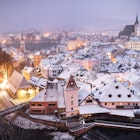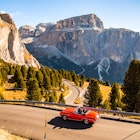
Lovers of science, listen up: our geeky instincts won’t be satisfied by yet another dreary natural history museum. If your brain cells are unstimulated by stuffed eagles and dusty models of the planets, Europe’s rich history of scientific discovery and wondrous natural sights are sure to inspire. Here are a few of the big hitters, for every kind of brainiac.
Physics buffs
Whether you’re an ardent debater of life, the universe and everything, or merely titter at typos of ‘Hadron Collider’, a visit to CERN in Geneva, Switzerland will blow your mind right open. At the world's largest particle physics lab, scientists are hoping to answer some of the universe’s most fundamental questions through the discovery of a Higgs boson-like particle. Organised tours will steer you around a lab where, underground, beams of trillions of volts are smashing into each other (book ahead).
The alternative: Marie Curie’s achievements can’t be overstated - two Nobel prizes in different disciplines, and the discovery of two new elements. Learn more about the work of this legendary physicist at the museum in her name in Warsaw.
Fossil hunters
The delightfully photogenic Jurassic Coast in Dorset, England is a magnet to fossil fans. Rummage for that perfect specimen on Monmouth Beach in Lyme Regis, where the crumbling cliffsides of clays and limestone layers deposit new fossils daily. Time your visit for a morning after the tide has gone out to maximise your chances of beating the rush - yes, there can be crowds. For tips on safe and eco-friendly fossil hunting, as well as tide times, check www.lymeregis.ukfossils.co.uk.
The alternative: admire geological wonders of a different kind at Northern Ireland’s Giant’s Causeway. Hexagonal basalt pillars create a truly surreal stretch of Irish coast.
Star-gazers
Romantic souls might name a constellation after their lover; geeks know it’s already called the Coma Berenices. Get inside the mind of the greatest of astronomers, Copernicus, who showed the Sun to be the centre of the universe. Museums have sprouted all over Poland to laud his achievements, and the finest are in his hometown of Toruń. The Nicolaus Copernicus House immerses you in the great polymath’s life and work and gives you a glimpse into medieval Europe.
The alternative: admire Galileo’s telescope in the Museo Galileo (www.museogalileo.it) in Florence, Italy. Or to star-spot yourself, remote areas of Scotland are famed for their light pollution-free skies (try www.gallowayastro.com for an organised holiday) and there are great choices in Portugal too (check out www.coaa.co.uk).
Geologists and vulcanologists
Nowhere in Europe does the ground grumble beneath your feet as much as Iceland. The country is sliced in two by the Mid-Atlantic Ridge, meaning it straddles the Eurasian and North American tectonic plates. Magma welling up from the ridge widens Iceland by an inch every year, and groundwater heated by magma spurts up as hot springs all over the country. Get acquainted with plenty more nerdy facts at Reykjavik’s Volcano Show and take a tour of the famous ‘Golden Circle’ to see geysers, hot springs and the dramatic rift valley at Thingvellir National Park.
The alternative: admire the view of Mt Etna in Sicily, or take a boat out to the reliably stroppy Stromboli. Learn more about Sicily's volcanoes with this guide.
Head-shrinkers
There may be haunting courtyards and clinical, echoing corridors (think Shutter Island), but the dark ambiance of the Dr Guislain Museum in Ghent, Belgium is misleading. As the expansive museum attests, legendary psychiatrist Dr Guislain was a trailblazer in the transition from shackles and imprisonment (the norm for mentally ill patients in the past) towards a more enlightened view of mental illness as curable through humane and supportive means. Learn more and plan your visit here: www.museumdrguislain.be.
The alternative: France teems with interesting history. Charenton, where spankaholic writer/philosopher the Marquis de Sade was imprisoned, still stands in Val-de-Marne outside the capital. And another famous asylum, the Salpêtrière in Paris, continues to treat France's good and great. If you're in the area, look out for the monument to the great pioneer of psychiatry Philippe Pinel.
Biologists
All that we know about human genetics began with a priest and some pea plants. The Medelovo Muzeum in Brno, Czech Republic, delves into the great mind of Gregor Mendel, the father of modern genetics, from his life and times right through to the latest advances in the field. The exhibition is housed in a stunning Augustinian abbey, where Mendel himself quietly cultivated peas while changing the face of science forever.
The alternative: if you like your biology a little more hands-on, why not witness a remarkable oddity of evolution in the animal world? The olm, or proteus, is blind amphibian adapted to live its entire life cycle in pitch darkness. Visit this ghostly creature in the caves of Postojna, Slovenia.
So much science, so little time. You can gaze up at Belgium's Atomium, there’s Bletchley Park for computer scientists, Bonn’s Arithmeum for mathematicians… where in Europe would you send a science fan? Tell us in the comments!
Explore related stories




 Destination Practicalities21 local tips to know before traveling to England
Destination Practicalities21 local tips to know before traveling to EnglandNov 21, 2024 • 9 min read






